| | | | | | | Axios World | | By Dave Lawler ·Dec 21, 2020 | | Hello and welcome to the 275th edition of Axios World — our final installment of 2020. - We'll be back and better than ever on Jan. 4, but I wanted to dedicate tonight's edition to what is sure to be one of the defining challenges of the year to come: vaccinating the world (1,666 words, 6 minutes).
- Thanks to all of you for reading this year, and a special holiday thanks to our wonderful copy editor Sheryl Miller for saving me from filling your inboxes with typos each week (and to Amy Stern for stepping into her shoes tonight).
New arrival? Sign up here. | | | | | | 1 big thing: The year(s) of the vaccine | 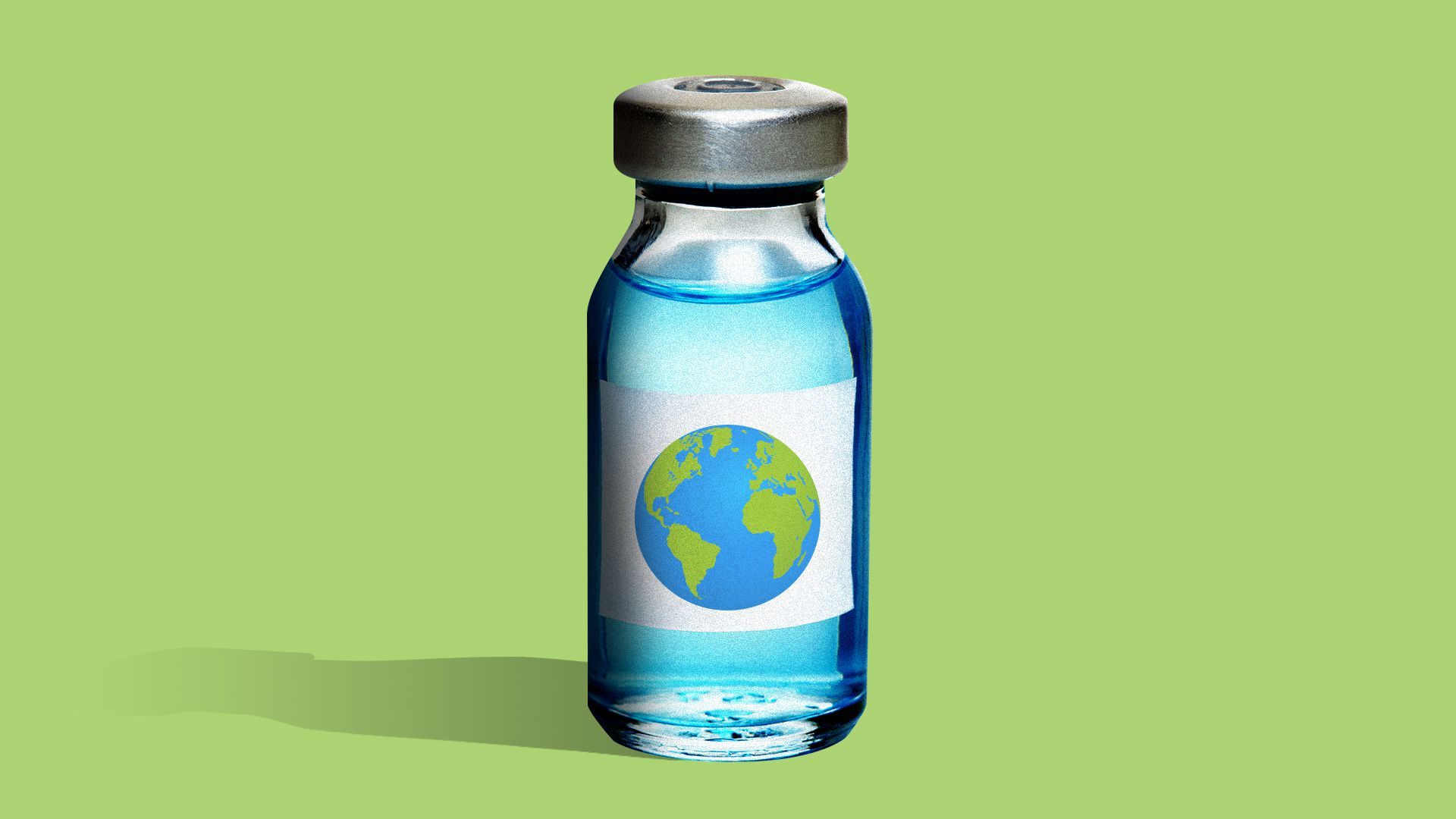 | | | Illustration: Aïda Amer/Axios | | | | The European Medicines Agency cleared the Pfizer/BioNTech vaccine for use across the EU today, with the rollout set to begin within days. Why it matters: Vaccinating the world will be perhaps the single greatest global challenge of 2021, and that process is now beginning in earnest — at least in the rich world. - If you're reading this in Europe, the U.S. or one of several other wealthy countries, you will probably have access to a vaccine in 2021.
- If you're in a lower-income country, particularly in sub-Saharan Africa, you could be waiting until 2023.
State of play: The first vaccines to gain regulatory approval in the West — from Pfizer and Moderna — are bound almost exclusively for wealthy countries, at least in the near term. - Many rich countries have hedged their bets by buying enough doses of several different vaccine candidates to cover their populations even if some candidates aren't approved.
Breaking it down: A forecast from The Economist Intelligence Unit projects that those countries — including the U.S., U.K., EU and Japan — will spend the first half of 2021 vaccinating priority groups and the second half of the year vaccinating the remainder of their populations. - In other high-income countries — as well as in countries like China, Brazil, India and Russia that are producing or manufacturing vaccines at scale — mass vaccination will begin next year but likely continue into early 2022.
- Other middle-income countries aren't expected to be able to vaccinate all high-priority groups until late 2021, with mass vaccinations continuing throughout 2022.
- Low-income countries that can't afford to purchase doses in bulk will still be vaccinating high-priority groups into early 2022, with mass vaccinations continuing throughout 2023 and perhaps into 2024.
What to watch: There are a number of variables that could shift that outlook significantly in either direction. 1. Further announcements on the safety, efficacy and scalability of additional vaccines, including those from Oxford/AstraZeneca, Johnson & Johnson, Novavax and Sanofi. - Those companies have together committed more than 2 billion doses to developing countries.
- Unlike the other leading candidates, J&J's vaccine requires only a single dose. Preliminary data from its phase III trial is expected next month, and approvals could potentially come as early as February.
- Sanofi's timeline is considerably longer after disappointing results from early stage trials.
2. More news on Russia's Sputnik V vaccine and on the several vaccines in development in China. - Both countries have cut deals to export doses around the world, including to lower-income countries. If China (pop. 1.4 billion) has one or more vaccines approved and becomes a net exporter, that could be a "game-changer," says Dr. Krishna Udayakumar, director of Duke's Global Health Innovation Center.
- "They are becoming the go-to because many middle-income countries are having to get to the back of the line for some of the more advanced vaccines," Udayakumar says.
3. The ability to increase manufacturing capacity in the developing world, and to build strong supply chains to ship and distribute doses globally. - More than half of all doses currently promised to lower-income countries are set to be produced by the Serum Institute of India.
- But manufacturers in countries including Argentina, Mexico, South Africa and Thailand are also striking deals to produce doses of the leading vaccine candidates locally, says Udayakumar.
4. The efficient distribution of unused doses by rich countries to poorer ones. - Canada, which has purchased more doses relative to its population size than any other country, is leading the charge on that front.
5. The engagement of the Biden administration. - President Trump skipped a global summit on vaccines and spurned the COVAX vaccine initiative, though his White House did say it would be "generous" once America's needs were met.
- President-elect Biden has said he'll re-engage with the World Health Organization and restore America's global leadership, but he hasn't spoken about a U.S. role in global vaccine distribution.
|     | | | | | | 2. The biggest piece of the puzzle |  Data: Gavi, The Vaccine Alliance; Map: Naema Ahmed/Axios The single biggest factor will be the success of the COVAX initiative, from the Gavi vaccine alliance, the Coalition for Epidemic Preparedness Innovations and the WHO. Driving the news: Those groups told reporters in a briefing on Friday that they're on track to meet their ambitious goal of ensuring at least 20% of the population in virtually every country on earth has access to a vaccine by the end of 2021. What they're saying: "We still need more doses, and, yes, we still need more money, but we have a clear pathway to procuring the original 2 billion doses and then beyond that... to end the acute stage of this pandemic," said Dr. Seth Berkley, the CEO of Gavi. The big picture: COVAX is the only route to a vaccine for dozens of countries, and wealthier participants will effectively subsidize their access. - Virtually the entire world has either joined, expressed an intention to do so, or been made eligible for subsidized access (the exceptions are Belarus, Kazakhstan, Russia and the U.S.).
- But it has been a struggle to secure the kind of funding for COVAX that is flowing into bilateral deals between countries and pharmaceutical companies.
What to watch: The aim for the first half of 2021 is to provide enough doses to all participant countries to cover frontline health and social care workers. - Then comes the 20% wave, which is intended to reach the most vulnerable people in each country (though countries themselves will control distribution).
- Udayakumar says the 20% target will be very difficult to hit next year, and 60%-70% vaccination rates — the target for herd immunity — are unlikely before the end of 2022 even in a best-case scenario.
- Yes, but: Vaccinating the most vulnerable and combining vaccination with other public health measures to slow the spread will allow "a real reduction in death and disability but also really an uptick in economic activity," he adds.
The big picture: Vaccines alone won't end the pandemic in 2021, but they should help set the course for recovery. |     | | | | | | 3. By the numbers |  At least 7.7 billion vaccine doses have already been purchased, with another 3.9 billion reserved should countries or blocs elect to expand their orders, according to Duke University's tracker. - If you combine both categories, the U.S. has reserved nearly one-quarter of the global supply with 2.6 billion doses.
- COVAX (not shown on our chart) is next with nearly 900 million doses locked in and just over two billion total.
|     | | | | | | 4. Which shot is this? | 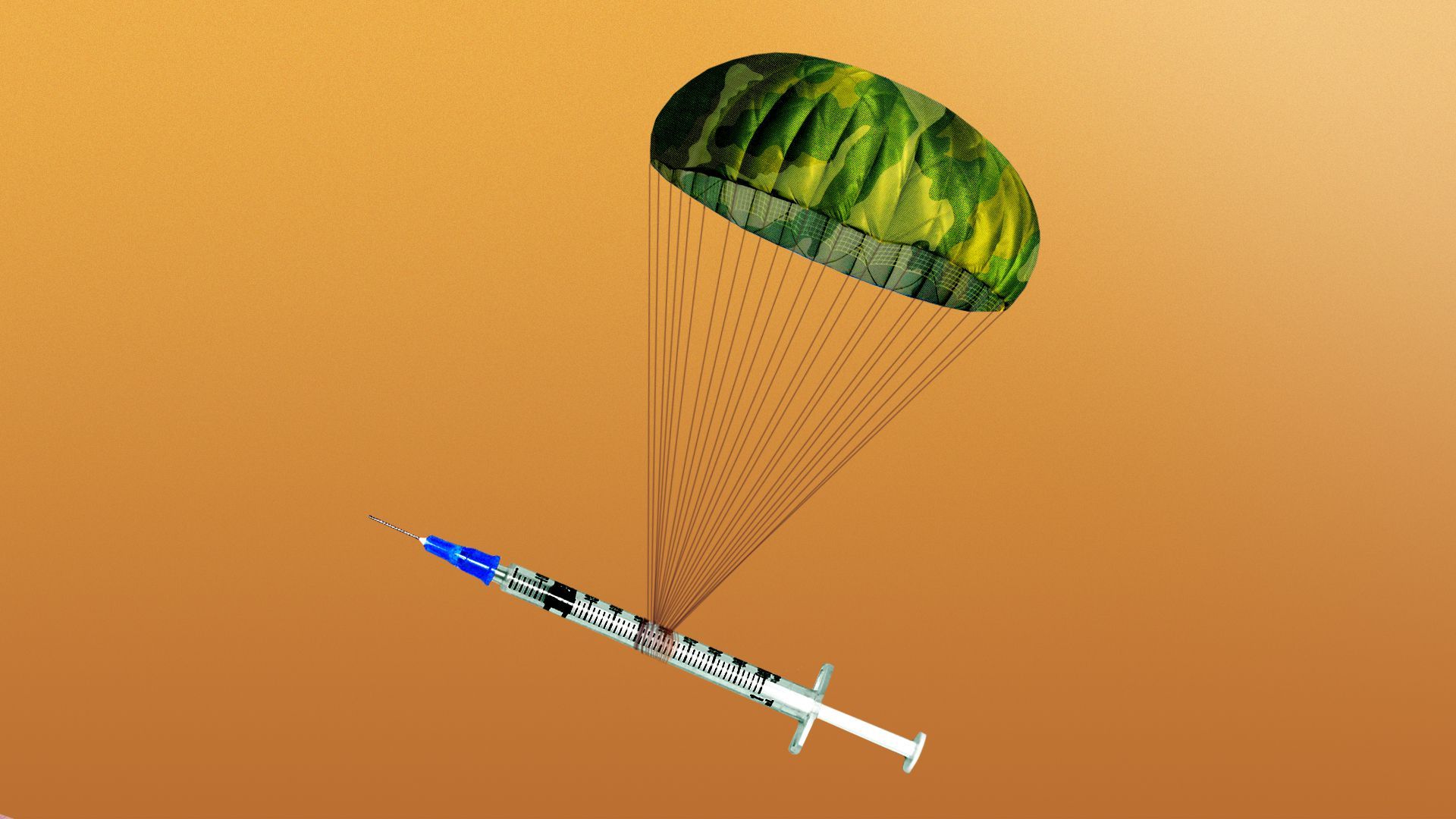 | | | Illustration: Annelise Capossela/Axios | | | | It's not just that access to doses varies wildly by income level — richer countries are also buying different vaccines than poorer ones. Zoom in: As the home of the world's largest vaccine manufacturer, India (pop. 1.4 billion) has sealed massive deals to begin to cover its enormous population. - Those deals are with Novavax, which has yet to release efficacy data, and AstraZeneca, whose vaccine appears to be about 70% effective but is undergoing further evaluation and testing, including in combination with Russia's Sputnik vaccine.
- The EU has purchased roughly the same number of doses but has a much more diversified portfolio. It includes 300 million doses of the Pfizer vaccine, the first shipments of which will begin on Thursday.
- Several developing countries have struck deals for just one vaccine candidate, often from Russia (as with Kazakhstan, Nepal and Venezuela) or China.
- Not a single country in sub-Saharan Africa has announced a deal to purchase vaccine doses, though J&J is aiming to produce 300 million doses in South Africa next year.
The big picture: It makes some sense for the mRNA vaccines that are first to market — from Pfizer and Moderna — to be rolled out initially in Europe and North America. - Those vaccines require super-cold storage temperatures and are relatively expensive to produce, two major hurdles for developing countries.
The bottom line: The hope is that vaccines that are cheaper and easy to transport — such as those from AstraZeneca and J&J — aren't too far behind. |     | | | | | | 5. State of the outbreak: Dark days for the U.K. | 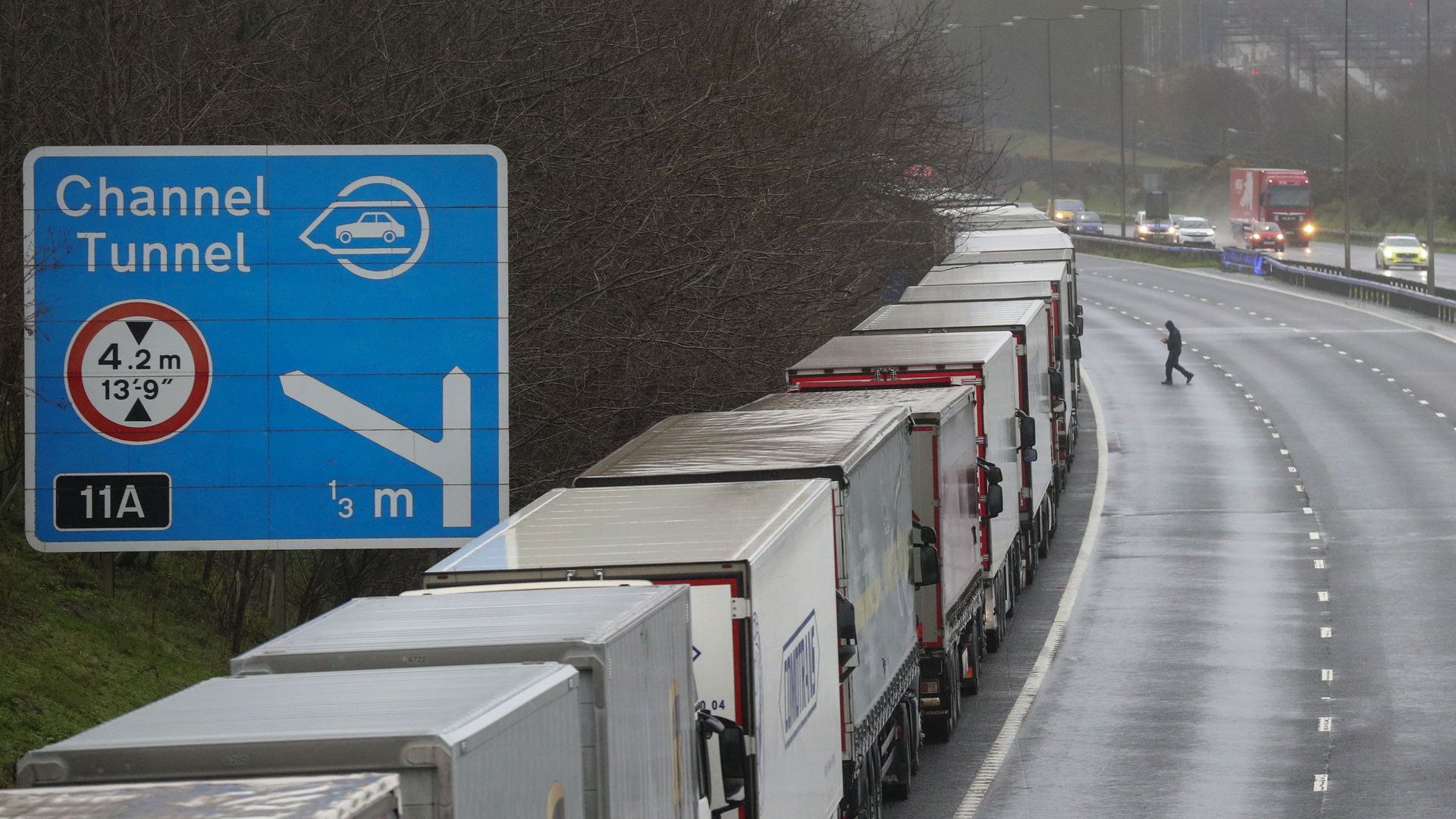 | | | Trucks parked on the highway after the Port of Dover was closed and access to the Eurotunnel terminal suspended. Photo: Steve Parsons/PA Images via Getty Images | | | | 1. The EU is gearing up to distribute the Pfizer vaccine around the continent and quickly shutting its doors to the U.K. following a new COVID-19 variant found there. - The bad news is that the mutation appears to be significantly more transmissible, as it's already accounting for the majority of new cases in Southeast England.
- The good news is that, based on the information currently available, experts don't believe it will render vaccines less effective.
2. Europe's second wave is not receding as had been hoped. - Italy is imposing national lockdowns specifically over Christmas and New Year's, Switzerland will close bars, restaurants and other venues tomorrow, while Austria is imposing a new lockdown immediately after Christmas.
- The U.K. is in a particularly dire crisis. Prime Minister Boris Johnson reversed himself to order a new, stricter lockdown over Christmas in London, while countries all over the world announced steps to keep British travelers out.
- All of this is happening with the U.K. on the verge of a potential no-deal Brexit from the EU, Axios' Zach Basu writes.
3. Thailand, which has had remarkable success in keeping the virus under control, is now facing a cluster of new cases. - The country is testing tens of thousands of people after discovering an outbreak at a seafood market near Bangkok.
4. A vaccine probably won't become a passport for international travel in 2021, Axios' Joann Muller writes. Instead, expect testing at both ends. |     | | | | | | 6. What I'm reading: Guess who's calling? | 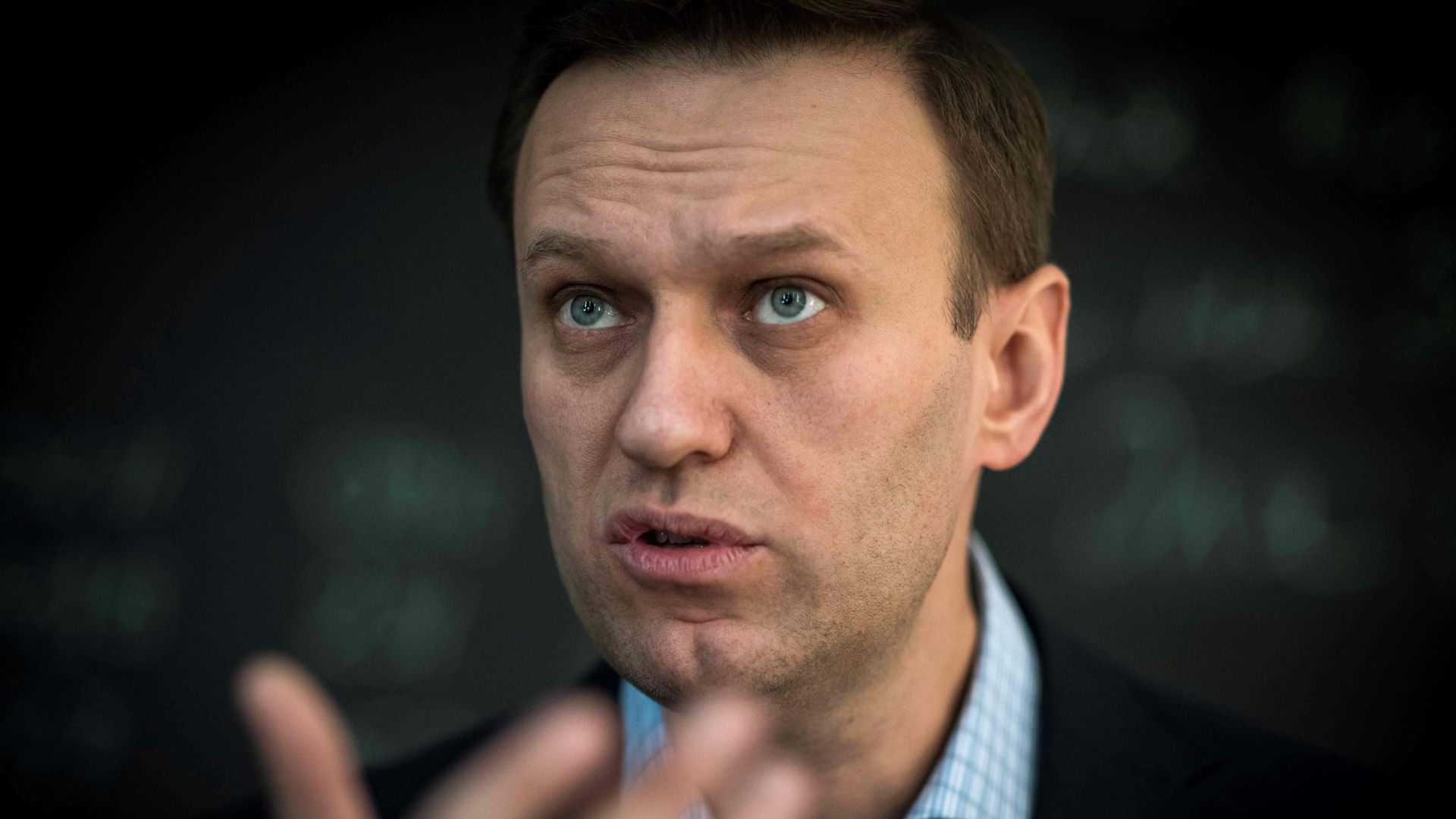 | | | Alexei Navalny. Photo: Mladen Antonov/AFP via Getty Images | | | | A late entrant for the craziest story of 2020... - One of the Russian agents who tailed opposition leader Alexei Navalny before his poisoning with the nerve agent Novichok in August was duped into revealing how the botched operation was carried out — in a 49-minute phone call with Navalny himself, Bellingcat reports.
Go deeper |     | | | | | | 7. Stories we're watching | 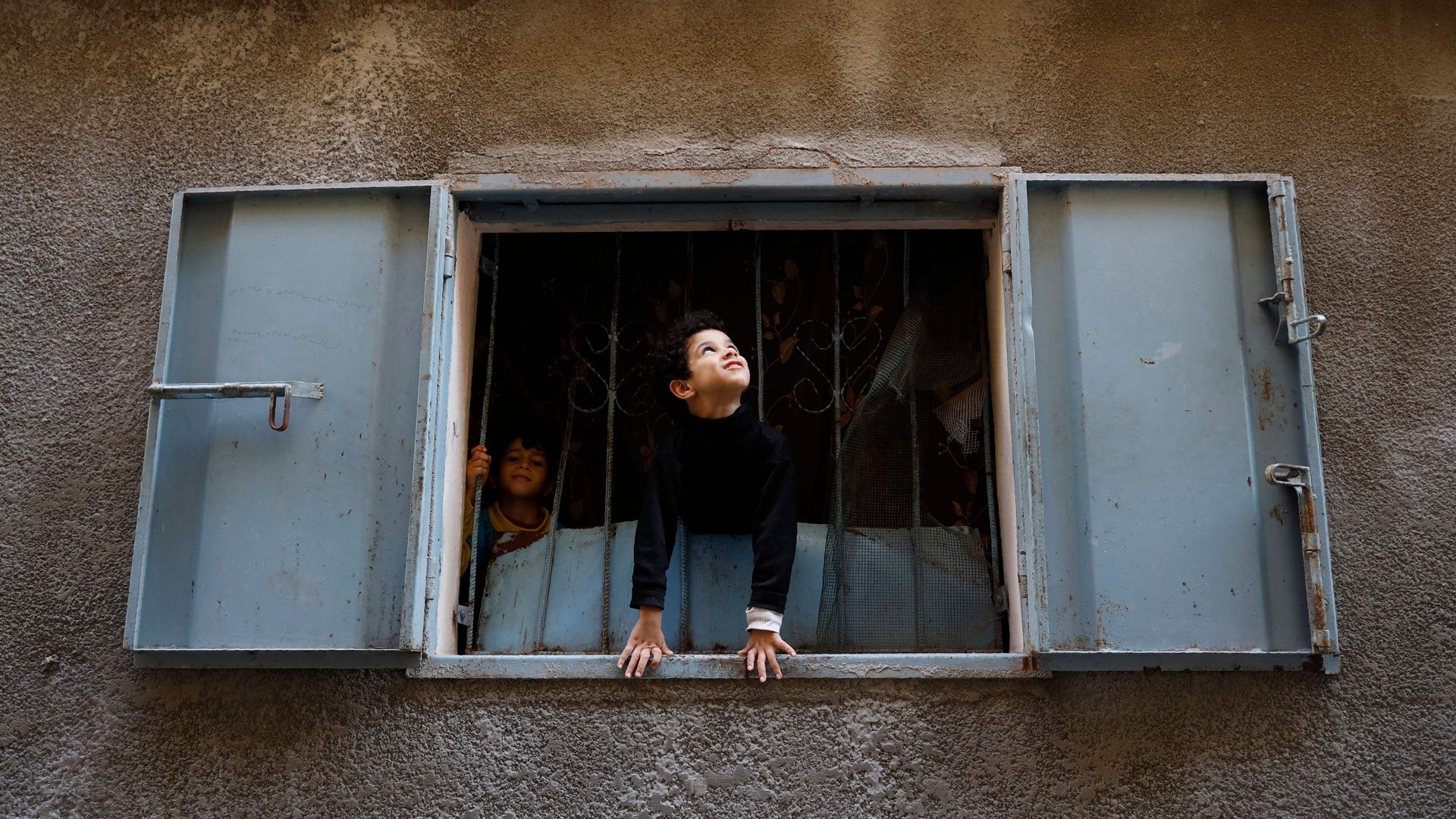 | | | Looking ahead to a sunnier 2021, from Gaza. Photo: Mohammed Abed/AFP via Getty | | | - Pentagon halts Biden briefings
- Biden and Mexico's López Obrador discuss "new approach" to migration
- Russian-linked cyberattack: Trump downplays, Pompeo accuses, experts react.
- U.S. plans to close two consulates in Russia
- U.S. warns Israel over Chinese tech investments
- Coal is bouncing back
- Mexico City bans nonessential activities
Quoted: I hope you all have a wonderful new year ahead and that those of you celebrating have a very merry Christmas. — Your author |     | | | | | | Axios thanks our partners for supporting our newsletters.
Sponsorship has no influence on editorial content. Axios, 3100 Clarendon Blvd, Suite 1300, Arlington VA 22201 | | | You received this email because you signed up for newsletters from Axios.
Change your preferences or unsubscribe here. | | | Was this email forwarded to you?
Sign up now to get Axios in your inbox. | | | | Follow Axios on social media:    | | | | | |











No comments:
Post a Comment